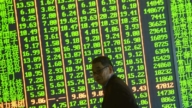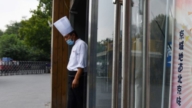【新唐人2012年9月6日訊】近30年來,中共在國內採取了保持經濟增長速度,促進國內生產總值(GDP)總量增長的政策,但同時積纍了巨大的負面影響。例如環境破壞,資源短缺,職業道德缺乏,腐敗蔓延,貧富差距懸殊,社會矛盾尖銳等等。中國經濟學界泰斗吳敬璉近期分析,要解決這些問題,當務之急是重啟改革議程,推進經濟改革和政治改革。
中國《財經》雜誌第331期封面文章,刊登了對中國經濟學界泰斗吳敬璉的專訪。探討中國經濟發展帶來的問題,以及今後中國何去何從。
吳敬璉指出,中國經濟社會矛盾幾乎到了臨界點,國內資源日益短缺,環境破壞嚴重,腐敗四處蔓延,貧富差別懸殊,社會矛盾激化。中國經濟能不能平穩增長,社會能不能和平轉型,都已成為重大的現實問題。
吳敬璉表示,當前社會上存在的種種醜惡現象,從根本上說是緣於經濟改革沒有完全到位、政治改革嚴重滯後、行政權力變本加厲的壓制和干預民間正當經濟活動,造成廣泛尋租活動的結果。他認爲,當務之急是重啟改革議程,推進市場化的經濟改革和法治化、民主化的政治改革。
吳敬璉的分析直指「政改」,不同於體制內很多人士將經濟體制改革和政治體制改革分開而論的想法。這篇文章被廣泛轉載,有網友評論說,這篇文章內容超越經濟範疇,是對整個中國現狀,包括政治現狀的透視和提出解決方案。也有學者表示贊同,說:經濟改革涉及的是權力和利益的重新分配,實際上也就是政治改革。
吳敬璉還指出,兩條前途嚴峻的路擺在中國前面。一條是沿著完善「市場經濟」的改革道路前行,限制行政權力,走向「法治的市場經濟」;另一條是沿著強化政府作用的「國家資本主義」的道路前行,走向「權貴資本主義」的窮途。
北京師範大學MBA導師段紹譯表示,「權貴經濟」是以犧牲老百姓的利益作為代價的,會使中國經濟的發展走向衰落。但「權貴資本主義」現在在中國已經有很明顯的現象。
北京師範大學MBA導師段紹譯:「比方説第一是,最賺錢的行業都是國有企業壟斷。而且壟斷企業的領導人哪,要麽就是政府高官的子弟,他們的親戚,要不就是會拍馬屁的人。」
北京律師肖國珍也認爲,如果不走「法制經濟」,中國將會非常危險。
北京律師肖國珍:「其實法制經濟它是唯一的出路。否則的話,市場必然走向一個瓶頸,一個死胡同,必然是不可持續發展,甚至是會發生可怕的崩潰。各個領域,法治的狀況都有很大的改善空間和潛力。」
這是最近三年,《財經》雜誌第三次刊發經濟學家呼籲「重啟改革議程」的文章。編者按說,呼籲之聲不絕於耳,表明改革遇到阻力,前行乏力。而多名學者向海外媒體表示,中國改革最大的障礙,就是「權貴資本」。
採訪/白梅 編輯/尚燕 後製/葛雷
Reforms: China’s Top Priority
As China’s GDP rocketed the last 30 years,
the Chinese Communist Party’s economic policy accrued negative effects on society.
Environmental damage, fall of business ethics, widespread
corruption, huge rich-poor gap and social conflicts, are some.
Wu Jinglian, China’s leading authority on economics,
recently proposed a solution to these issues.
Wu said, the current top priority for the authorities
is to carry out economic and political reforms.
The cover article of China’s Caijing magazine, Issue 331,
talked about an exclusive interview with Wu Jinglian.
Wu is known as a leading authority
on China’s economy.
The interview discussed issues created in China
by its economic growth as well as China’s future path.
Wu Jinglian said conflicts in China’s economy and society
have been close to critical point.
Clashes intensify with the growing shortage of domestic
resources, environmental destruction, corruption and the widening rich-poor gap.
Can China’s economy have a stable growth?
Will China see a smooth social transition?
Both questions, Wu Jinlian believes,
are major issues that China has to face.
Wu Jinglian analyzed the root causes behind evils
that are currently running rampant in China.
It is caused by failed implementation of economic reforms,
lagging political reform, intensified repression of administrative power and officials’market intervention.
Wu Jinlian said, China’s top priority now
is to restart reforms in economy and politics.
Wu Jinlian’s analysis directly targets “political reform."
The view is different from other Chinese economists’
separation of economic reform from political reform.
The interview has been widely reproduced on the internet.
Netizens commented that the article offers an insight and
a solution to China’s status quo in economy and politics.
Some scholars applauded it, saying economic reform
is political reform, as it involves power and interest redistribution.
Wu Jinlian pointed out two rigorous paths
lying in front of China.
One is to head for “market economy under the rule of law"
by implementing economic reform and checking administrative power.
The other is to develop “state capitalism".
This would require strengthening the government’s role
to realize the dead-end “crony capitalism."
Duan Shaoyi, an MBA mentor at Beijing Normal University,
comments on the “crony capitalism."
Duan says it exists at the expense of Chinese civilians’
interests and will lead to China’s economic decline.
However, China has obviously exhibited “crony capitalism"
in reality, according to Duan.
Duan Shaoyi: “For example, China’s most profitable sectors
have all been monopolized by state-owned enterprises(SOE).
And all the SOE leaders are either offspring or relatives
of high-ranking government officials, or those flatterers."
Beijing-based lawyer Xiao Guozhen says, China will be
very dangerous if failing to realize the rule of law in economy.
Xiao Guozhen: “The economy under the rule of law is
the only way out for China. I don’t see other options.
If the economy lacks rule of law, it cannot be sustainable,
and could even see a terrible crash.
All sectors in China have great potentials
in light of improving rule of law."
This is Caijing’s third article about economists’ appeal
to reinitiate reforms in the last three years.
The editor’s note said, the incessant appeals indicate
that reforms have been subject to resistance.
Overseas media reported that a number of scholars viewed
“crony capitalism" as the biggest obstacle for China’s reform.




























